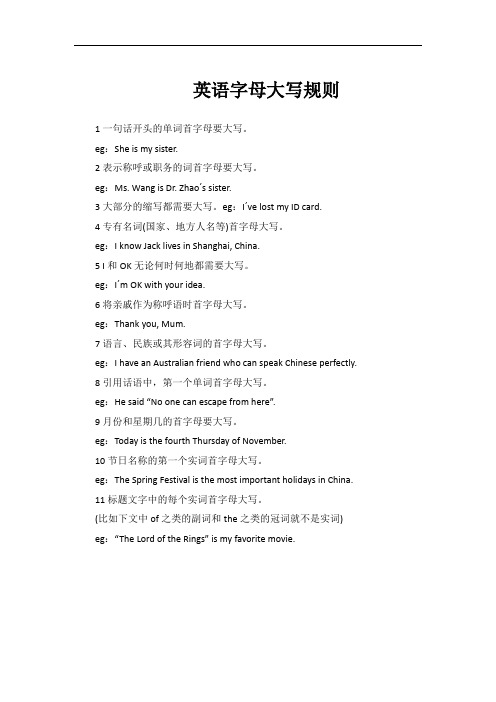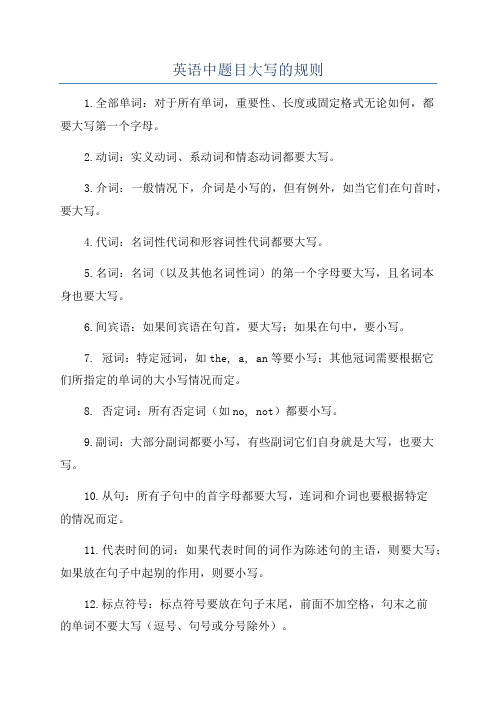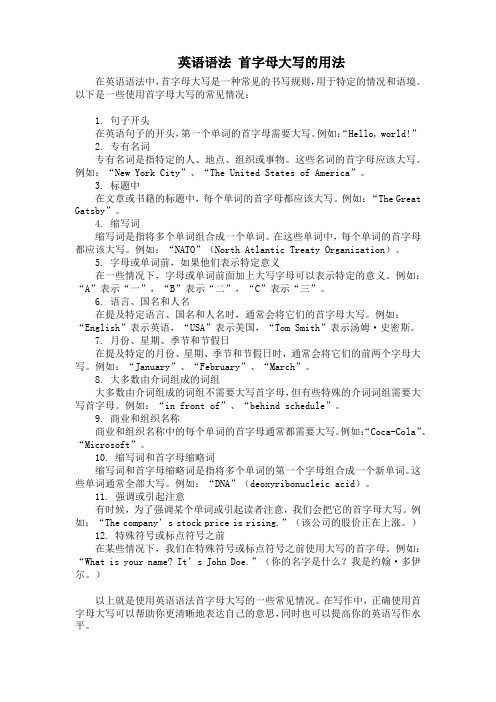英语字母在什么时候要大写
英语字母大写规则

英语字母大写规则
1一句话开头的单词首字母要大写。
eg:She is my sister.
2表示称呼或职务的词首字母要大写。
eg:Ms. Wang is Dr. Zhao´s sister.
3大部分的缩写都需要大写。
eg:I´ve lost my ID card.
4专有名词(国家、地方人名等)首字母大写。
eg:I know Jack lives in Shanghai, China.
5 I和OK无论何时何地都需要大写。
eg:I´m OK with your idea.
6将亲戚作为称呼语时首字母大写。
eg:Thank you, Mum.
7语言、民族或其形容词的首字母大写。
eg:I have an Australian friend who can speak Chinese perfectly. 8引用话语中,第一个单词首字母大写。
eg:He said “No one can escape from here”.
9月份和星期几的首字母要大写。
eg:Today is the fourth Thursday of November.
10节日名称的第一个实词首字母大写。
eg:The Spring Festival is the most important holidays in China. 11标题文字中的每个实词首字母大写。
(比如下文中of之类的副词和the之类的冠词就不是实词) eg:“The Lord of the Rings” is my favorite movie.。
英语字母在什么时候要大写

●许多人写英语文章时,对大写字母的使用(capitalization) ,感到有点「迷惑」。
虽然咱们在文法裡也学过英文大写字母的用法,但如能把重要的规那么,复习一下,也许可加深记忆!(1) 每个句子的第一个字(first word of a sentence) 以及写信的地址,信中的开头称呼与结尾,都要大写。
例如:How is everything with you today (你今天一切都好吗?)25 Park Street, Silver Spring, Maryland.写信开头称呼:Dear Mr. Wang, Hello, Bob, Greetings, Mary, 信中结尾:Sincerely yours, Yours truly, Best wishes, With love, Respectfully yours, 等等。
(2) 表示特定的人、地或物的专有名词(names of a specific person, place or thing) 或是属於专有名词的一局部,都要大写。
例如:Mr. Wang Dachung was born in China. (王大中先生在中国出生。
)Bob Smith sailed on the Queen Elizabeth for a trip to France. (Bob Smith 乘伊莉沙白邮轮到法国旅游。
)其他如:Yale School of Law (耶鲁法学院)Declaration of Independence (独立宣言)The American Society for the Prevention of Cruelty toAnimals. (美国防止虐待动物协会) 等等。
註:专有名词中的冠词、介词、连接词都不必大写,除非是名字的开头与结尾。
(如上句裡的for, the, of, to) 但是指普通名词时,那么不必大写。
英语单词大写规则

英语单词大写规则 It was last revised on January 2, 2021在英语写作中,很多情况下要使用大写字母。
其使用规则大致如下:(1) 所有句子的第一个单词的首字母要大写,包括引语中的句子。
如:You should wear loose clothing in hot weather.He suggested, “The meeting should be put off till next.”(2) 专有名词,包括人名、地名、国名等要大写。
如:Mary and Steve moved in the next door to the Johnsons.China and India are developing countries.(3) 表示种族、国籍、宗教、语言等的词语要大写。
如:Chinese, Islamism, Christian, English(4) 标题中位于首尾的单词要大写;其他位置的除冠词、连词、介词外都要大写。
如:Gone with the Wind.(5) 头衔放在人名前要大写;头衔表示的职位如果仅一人担任,而且头衔可以用来代替人名时,要大写。
如:General George MarshallProfessor Shirley OresThe Prime Minister arrives tomorrow.(6) 报纸、杂志、电影、戏剧、歌曲、书名等要大写。
如:Overseas DigestA Tale of the White Snake.(7) 各种组织、俱乐部等的名字要大写。
如:the National Organization for Womenthe Chess Club(8) 表示月份、星期、节日的名词要大写。
如:Thanksgiving is celebrated on the third Thursday of November.(9) 商品的商标名要大写。
英语中题目大写的规则

英语中题目大写的规则
1.全部单词:对于所有单词,重要性、长度或固定格式无论如何,都
要大写第一个字母。
2.动词:实义动词、系动词和情态动词都要大写。
3.介词:一般情况下,介词是小写的,但有例外,如当它们在句首时,要大写。
4.代词:名词性代词和形容词性代词都要大写。
5.名词:名词(以及其他名词性词)的第一个字母要大写,且名词本
身也要大写。
6.间宾语:如果间宾语在句首,要大写;如果在句中,要小写。
7. 冠词:特定冠词,如the, a, an等要小写;其他冠词需要根据它
们所指定的单词的大小写情况而定。
8. 否定词:所有否定词(如no, not)都要小写。
9.副词:大部分副词都要小写,有些副词它们自身就是大写,也要大写。
10.从句:所有子句中的首字母都要大写,连词和介词也要根据特定
的情况而定。
11.代表时间的词:如果代表时间的词作为陈述句的主语,则要大写;如果放在句子中起别的作用,则要小写。
12.标点符号:标点符号要放在句子末尾,前面不加空格,句末之前
的单词不要大写(逗号、句号或分号除外)。
英语字母何时要大写

龙源期刊网
英语字母何时要大写
作者:陈强
来源:《阅读·中年级》2011年第03期
1.英语句子开头的第一个单词的首字母要大写。
例如:This is a book,这是一本书。
2.姓名中表示姓和名的单词的首字母要大写。
例如:Jenny Smith 詹妮·史密斯Jenny Smith
3.表示称呼或职务的词的首字母要大写。
例如:Mr.Brown布朗先生
4.表示国家、城市、语言、国籍等词的首字母要大写。
例如:England英国Beijing北京English英语Chinese中国人
5.表示编号的词的首字母要大写。
例如:Lesson Two第二课
6.表示星期、月份、节日等词的首字母要大写。
例如:Sunday 星期天 Septmber九月Teachers’Day教师节
7.大多数缩写词要大写。
英语语法 首字母大写的用法

英语语法首字母大写的用法在英语语法中,首字母大写是一种常见的书写规则,用于特定的情况和语境。
以下是一些使用首字母大写的常见情况:1. 句子开头在英语句子的开头,第一个单词的首字母需要大写。
例如:“Hello, world!”2. 专有名词专有名词是指特定的人、地点、组织或事物。
这些名词的首字母应该大写。
例如:“New York City”、“The United States of America”。
3. 标题中在文章或书籍的标题中,每个单词的首字母都应该大写。
例如:“The Great Gatsby”。
4. 缩写词缩写词是指将多个单词组合成一个单词。
在这些单词中,每个单词的首字母都应该大写。
例如:“NATO”(North Atlantic Treaty Organization)。
5. 字母或单词前,如果他们表示特定意义在一些情况下,字母或单词前面加上大写字母可以表示特定的意义。
例如:“A”表示“一”,“B”表示“二”,“C”表示“三”。
6. 语言、国名和人名在提及特定语言、国名和人名时,通常会将它们的首字母大写。
例如:“English”表示英语,“USA”表示美国,“Tom Smith”表示汤姆·史密斯。
7. 月份、星期、季节和节假日在提及特定的月份、星期、季节和节假日时,通常会将它们的前两个字母大写。
例如:“January”、“February”、“March”。
8. 大多数由介词组成的词组大多数由介词组成的词组不需要大写首字母,但有些特殊的介词词组需要大写首字母。
例如:“in front of”、“behind schedule”。
9. 商业和组织名称商业和组织名称中的每个单词的首字母通常都需要大写。
例如:“Coca-Cola”、“Microsoft”。
10. 缩写词和首字母缩略词缩写词和首字母缩略词是指将多个单词的第一个字母组合成一个新单词。
这些单词通常全部大写。
例如:“DNA”(deoxyribonucleic acid)。
英语大写规则
英语大写规则
1. 一句话的第一个单词首字母要大写。
如:She is my sister.
2. 表示称呼或职务的词首字母大写,人名要大写。
如:Ms. Wang is Prof. Zhao’s sister.
3. 大部分的缩写都需要大写。
如:I’ve lost my ID card.
4. I和OK无论何时何地都需要大写。
如:I’m OK with your idea.
5. 专有名词(如国家、地方和人名等等)的首字母大写。
如:I know Jack lives in Shanghai, China.
6. 将亲戚作为称呼语时首字母大写。
如:Thank you, Mum.
7. 语言、民族或其形容词的首字母大写。
如:I have an Australian friend who can speak Chinese perfectly.
8. 在引用的话语中,句子第一个单词首字母大写。
如:He said “No one can escape from here”.
9. 月份和星期几的首字母要大写。
如:Today is the fourth Thursday of November.
10. 节日名称的第一个实词首字母大写。
如:The Spring Festival is the most important holidays in China.
11. 标题文字中的每个实词首字母大写(比如下文中of之类的副词和the之类的冠词就不是实词)。
如:”The Lord of the Rings”is my favorite movie.。
小学英语何时字母要大写
何时字母要大写
一、句子开头第一个单词的第一个字母要大写。
如:What class are you in?
二、人称代词 I(当“我”讲)及 OK 在句中的任何位置都必须大写。
如:
Am I eleven?
That’s OK.
三、姓和名的词首字母都要大写。
如: Jim Green,Wang Lin
四、表示称呼的词首字母要大写。
如: Miss Gao. Mr. Li.
五、表示国家、语言、城市、某国人等词首字母要大写。
如:
China, Shanghai, English等。
六、用英语表示编号时,前后词首字母要大写。
如:
Class Two(=Class 2).Lesson One(=Lesson 1)
七、书、刊、报名称及文章标题中每个实词的词首字母要大写或全都采用大写字母。
如:
English Weekly(ENGLISH WEEKLY)《英语周报》
Eyes on the World
八、星期、节日名称词首字母要大写。
如:
Sunday(星期日)Teachers’ Day(教师节)
九、某些缩略词的字母要大写。
如:
A.D(公元) TV电视。
英语中需要大写的几种情况
英语中需要大写的几种情况
英语中需要大写的情况包括但不限于以下几种:
1. 名词所有格:当名词所有格形式出现时,例如yours, his, her, its, our, their等,需要大写字母。
2. 姓氏上方的冠词:当姓氏上方出现不定冠词(a, an)或定冠词(the)时,需要大写。
3. 表示尊称或尊敬的词语:例如丈人、先生、女士、陛下等,这些词语通常需要大写。
4. 表示重要或尊敬的句子开头:例如座右铭、名言、著名演讲等,这些句子开头通常需要大写。
5. 正式文件或书信:例如合同、报告、辞职信等,这些文件或书信通常需要大写。
6. 表示职位或职务的词语:例如CEO、教授、经理等,这些词语通常需要大写。
7. 表示时间或日期的词语:例如今天、明年、上个月等,这些词语通常需要大写。
大写字母的使用可以帮助人们更好地识别和区分不同的单词和短语,是英语中不可或缺的一部分。
在日常学习和工作中,我们应该熟练掌握大写字母的使用,以便更好地表达自己的观点和语言。
英文字母大写的情况
不要忽略英语写作中的大写字母很多情况下要使用大写字母。
其使用规则大致如下:(1)所有句子第一个单词的首字母要大写,包括引语中的句子。
例如:You should wear loose clothing in hot weather.He suggested, “The meeting should be put off till next Monday.”(2)专有名词,包括人名、地名、国名等要大写。
例如:Mary and Steve moved in the next door to the Johnsons.China and India are developing countries.(3)表示种族、国籍、宗教、语言等的词语要大写。
例如:Chinese, Islamism, Christian, English(4)标题中凡实词一律大写,如系虚词(如冠词、连词、介词等)则一律小写。
较长的虚词(指6个字母以上)仍须大写。
标题中位于首尾的单词要大写。
例如:Gone with the Wind(5)头衔放在人名前要大写;头衔表示的职位如果仅一人担任,而且头衔可以用来代替人名时,要大写。
例如:General George MarshallProfessor Shirley OresThe Prime Minister arrives tomorrow.(6)报纸、杂志、电影、戏剧、歌曲、书名等要大写。
例如:Overseas DigestA Tale of the White Snake(7)各种组织、俱乐部等的名字要大写。
例如:the National Organization for Womenthe Chess Club(8)表示月份、星期、节日的名词要大写。
例如:Thanksgiving is celebrated on the third Thursday of November.(9)商品的商标名要大写。
- 1、下载文档前请自行甄别文档内容的完整性,平台不提供额外的编辑、内容补充、找答案等附加服务。
- 2、"仅部分预览"的文档,不可在线预览部分如存在完整性等问题,可反馈申请退款(可完整预览的文档不适用该条件!)。
- 3、如文档侵犯您的权益,请联系客服反馈,我们会尽快为您处理(人工客服工作时间:9:00-18:30)。
●许多人写英语文章时,对大写字母的使用(capitalization) ,感到有点「迷惑」。
虽然咱们在文法裡也学过英文大写字母的用法,但如能把重要的规则,复习一下,也许可加深记忆!(1) 每个句子的第一个字(first word of a sentence) 以及写信的地址,信中的开头称呼和结尾,都要大写。
例如:How is everything with you today? (你今天一切都好吗?)25 Park Street, Silver Spring, Maryland.写信开头称呼:Dear Mr. Wang, Hello, Bob, Greetings, Mary,信中结尾:Sincerely yours, Yours truly, Best wishes, With love, Respectfully yours, 等等。
(2) 表示特定的人、地或物的专有名词(names of a specific person, place or thing) 或是属於专有名词的一部分,都要大写。
例如:Mr. Wang Dachung was born in China. (王大中先生在中国出生。
)Bob Smith sailed on the Queen Elizabeth for a trip to France. (Bob Smith 乘伊莉沙白邮轮到法国旅游。
)其他如:Yale School of Law (耶鲁法学院)Declaration of Independence (独立宣言)The American Society for the Prevention of Cruelty to Animals. (美国防止虐待动物协会) 等等。
註:专有名词中的冠词、介词、连接词都不必大写,除非是名字的开头与结尾。
(如上句裡的for, the, of, to) 但是指普通名词时,则不必大写。
例如:The two men sailed on a ship for a trip to some foreign countries. (两位男子乘船到外国旅行。
) (即句中的men,ship,countries 都是普通名词)(3) 一星期七天,十二个月份,以及假日(seven days of the week, 12 months and holidays) 都要大写。
例如:The Chens came to see me on Father's Day. (父亲节陈家来看我。
)He works on Saturdays and Sundays. (星期六和星期天他都要上班。
)His store closed during January and February. (元月和2月,他的商店不开。
)但是春夏秋冬四季,则不要大写:例如:Mr. A will stay in Florida next winter. (下个冬天A 先生将住在佛州。
)The fall semester starts in September. (秋季班9 月开始。
)In Maryland July and August are summer months. (在马里兰州7月和8月是夏天。
)註:地球(earth) 、太阳(sun) 、月亮(moon) 也不要大写。
(4) 学校的特指课程名称以及各国的语文,都要大写。
例如:Her daughter will take Math Ⅱand Algebra Ⅲthis semester. (她女儿本学期选修数学Ⅱ和代数Ⅲ。
)All new students have to take History 101. (所有新生都要选修歷史101。
)Did you study English literature and American history? (你读过英国文学和美国歷史吗?) Many American students now take Chinese in the big universities. (在大的大学裡,许多美国学生选修中文。
)但是指一般性的课程或一般知识,则不必大写。
例如:Many Chinese students are good at mathematics. (许多中国学生数学很棒。
)High school students are encouraged to take music and history. (鼓励高中生选修音乐和歷史。
)(5) 地理上特有的名称(geographical names) ,诸如国家、州、省、城市、山脉、湖、河流、公园等都要大写。
例如:Have your parents ever been to Africa?(你的父母去过非洲吗?)His dream trip would be a cruise across the Atlantic Ocean. (他的理想旅游是坐邮轮横渡大西洋。
)We have lived in Maryland for over 25 years. (我们住在马里兰州已超过25年。
)The company is located in the middle of Fifth Avenue. (公司坐落於第五大道的中间。
)其餘如:Asia, China, Lake Michigan (密西根湖) ,Black Sea (黑海) ,Rocky Mountains (洛磯山脉) ,Yellowstone National Park (黄石国家公园) 等等的特别名称,还有东、南、西、北地区和位置(region and location) 也要大写。
例如:Living in the East I have never seen high mountains. (我住在东部,没有见过高山。
)The North of China is experiencing a serious drought. (中国北部旱灾严重。
)但是east, west, north, south 只指方向(direction) 时,则不必大写。
例如:Drive south for one mile and you will see the building. (往南开一哩路,就可以看到楼房。
) Please turn north at the next corner. (请在下一角落,往北转。
)(6) 社会上的职位或专业上的头衔(social and professional titles) 包括学位和得奖名称(award) ,都要大写。
例如:Professor Lee,Ph.D.,is from Taiwan. (李教授博士,来自台湾。
)Dr. Anderson, M.D., is well-liked by his patients. (医学博士安德生医师,深受病患喜爱。
) President Bush, MBA from Harvard, was a business man. (哈佛大学企管硕士的布希总统,过去是位商人。
)His Reverend Smith and Father Jackson were both present at the meeting. (Smith 牧师和Jackson 神父都参加开会。
)其他头衔如:Sir, Mister, Miss, Madame (夫人) ,Congressman (国会议员) ,Senator (参议员) ,Governor (州长) ,Mayor (市长) ,Secretory of State (国务卿) ,Attorney (律师) ,Judge (法官) ,Bishop (主教) ,Sister (修女) ,Sergeant (士官) ,Corporal (下士) ,Lieutenant (中尉) 等等。
注意:如果不跟个人名字一同使用,或不是特指某人的头衔时,则不必大写。
例如:He is a professor at a university. (他是大学教授。
)The mayor of a large city has a tough job. (大城市的市长难為。
)The presidents of many companies attended the conference. (许多公司的董事长都来参加会议。
) (上面的professor, mayor, presidents,都是指一般性的。
)(7) 书名、文章题目、报章杂誌中的主要字(key words) ,都要大写。
还有短篇故事(short story) ,诗(poem) ,戏剧(play) ,电影(movie) ,歌曲(song) ,绘画(painting) ,雕刻(sculpture) 等名称,也要大写。
例如:Mr. Wang has authored a book entitled My Life in America. (王先生写了一本书叫:「我的美国生活」。
)Did you read the latest issue of Time Magazine? (你看了最新一期的「时代杂誌」吗?)其他如:The Sound of Music (歌名) ,Mona Lisa (蒙娜丽莎肖像画名) ,Bird in Space (雕刻名称) ,Popular Mechanics (杂誌名称) ,Death of a Salesman (戏剧名称) ,The Tale of Two Cities (双城记) ,The Adventures of Tom Sawyer (汤姆歷险记) 等等。
註:文章题目裡的冠词、介词和连接词都不必大写。
但不定词的to,通常要大写。
例如:Did you read Mr. Wang's article“Ways To Make Money”?(你读过王先生大作「赚钱之道」吗?) (「to make」是infinitive)(8) 谈到神(God or Deity) 或宗教与种族(religion and race) 时,名词及代名词都要大写。
例如:He said that God will take good care of his wife. (他说上帝会好好照顾他的太太)We pray Lord's (或God's) help and His blessings upon her. (我们祈求上帝帮助以及对她的祝福。
)(His blessing 是指上帝的祝福。
)Many people say that the Japanese are more aggressive than the Chinese. (许多人认為日本人比中国人更有侵略性。
